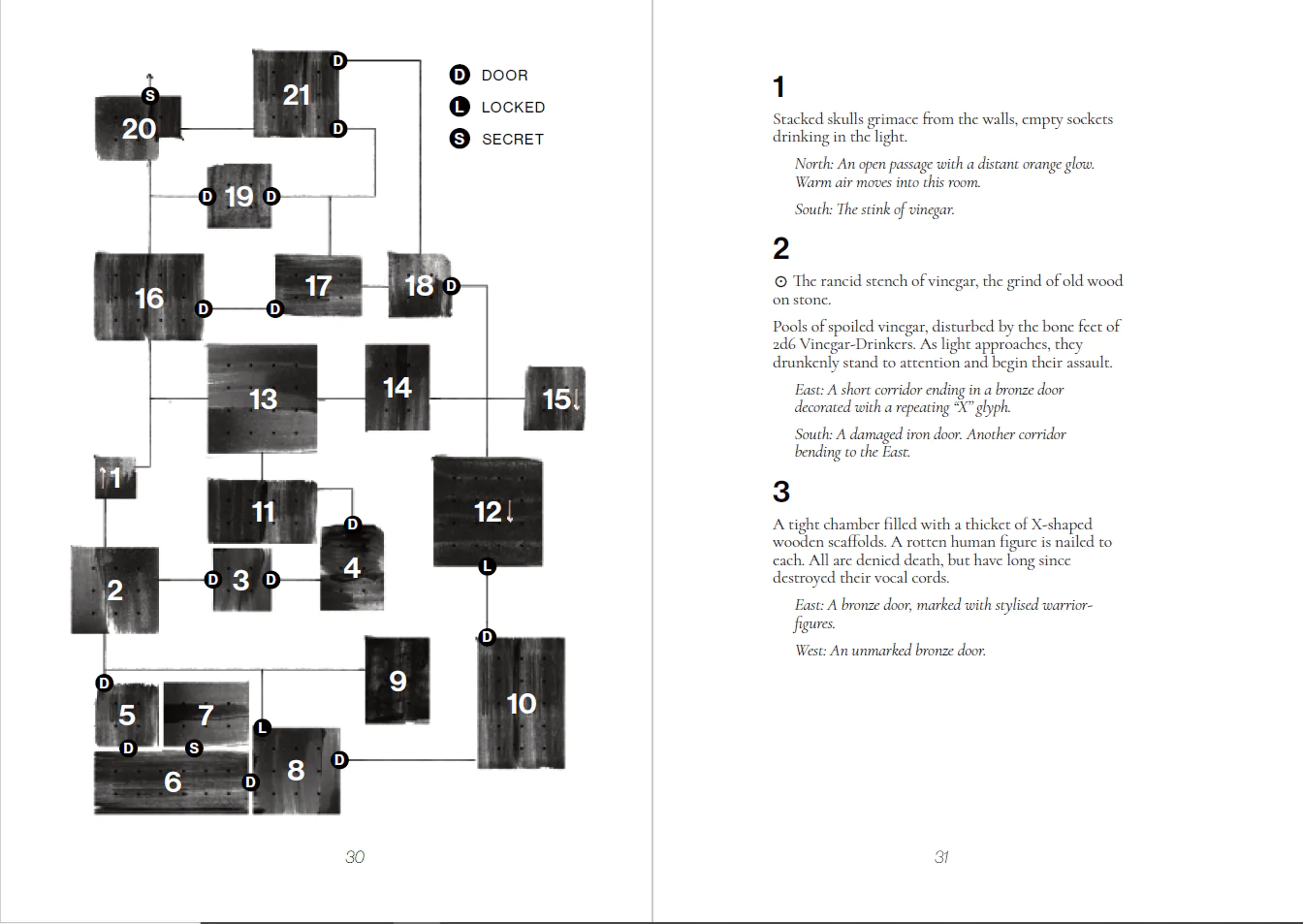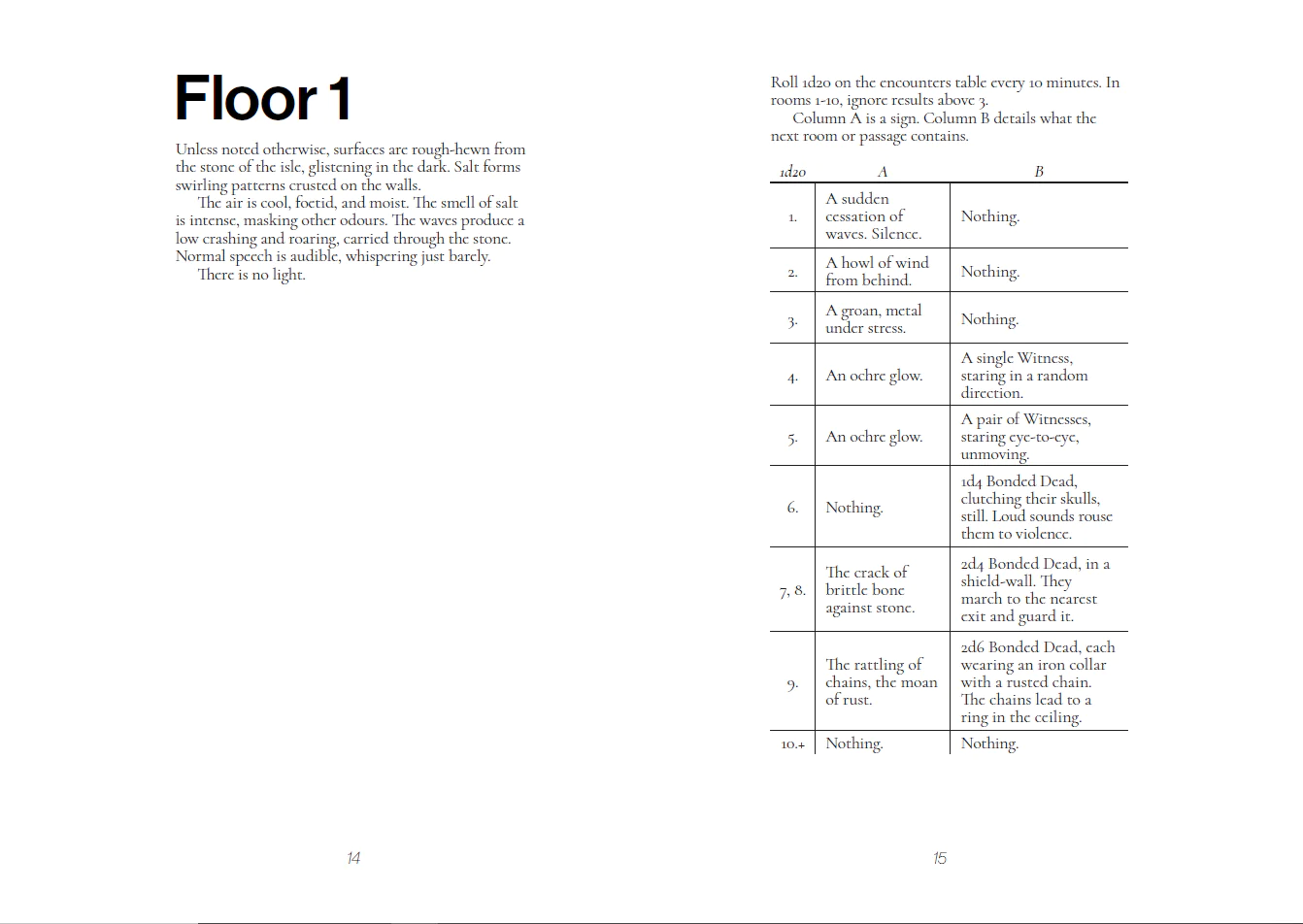The Isle Review

This adventure is written by Luke Gearing (of Fever Swamp, Acid Death Fantasy, and Gradient Descent fame). You can get a copy of The Isle from Spear Witch.
My only complaint is that I found the adventure itself to be very grim. There are a lot of unpleasant rooms and minimal opportunities for rest or joy. This adventure is also very gross, in the same way that a gory B-movie is gross: quivering sphincters, squelching flesh, bloody mounds, etc.
I probably won’t run it (since I prefer a lighter beer-n-pretzels kind of game), but I could see a lot of groups really digging the vibes here.
The Isle is packed with clever encounters and creatures. A lot of monsters have ways they can be avoided or defeated outside of combat. Traps have multiple solutions. The rooms have many connections and secret passages. The entire thing just drips with smart design.
There’s a LOT of good stuff here, I just didn’t like the tone/vibes of the overall adventure.
With that out of the way, there are two things I am excited to talk about:
Minimal presentation
The Isle’s “novel” approach
Starting with the most obvious aspect of the book:
1. Minimal Presentation Permalink

It is commonly accepted wisdom that tabletop rpgs require artwork to inspire the reader. This is particularly true when most readers will end up running the game for other players who haven’t read the book themselves. The stronger we can make that initial impression, the easier time the GM will have passing it along to their table.
And for the most part, I agree with this. Way back in 2014 I attempted to publish a version of Mythic Mortals that didn’t have any art (except for a handful of awkward public domain pieces). It…was not well received. The need for art prompted me to launch my first Kickstarter campaign. The rest is history.
The Isle is the first time since 2014 that I have ever questioned the need for artwork in a module.
For one, Luke Gearing’s purple prose is so evocative that it encourages imagination. Here’s my favorite bit where he describes the Radial Snail:
Radial Snail The sea learned of blades and war from drowned men and sunken ships. She imparted this burden upon snails, who grew to the ize of dogs. The bent bronze blades cast into the ocean in supplication for countless centuries of sins coalesced around them, and became their shells. HD 4. AC 8. Always act last.
DAMN! I have this image of snail shells wrought from twisted swords and bent shields. Is it an EXACT description? No, but its EVOCATIVE. I fill in the gaps with my own imagination and the resulting image is seared into my brain.
Your mileage my vary; sometimes Luke’s prose slides off my brain and leaves no impact. But for the large majority, I have a strong impression of whatever monster/room/treasure he’s describing.
The lack of art and layout lend even more weight to his words.
It also leads into the discussion about reading vs playing.
2. Reading vs Playing Permalink

While I don’t fully agree with Skerple’s “3 Types of Module”, it is useful in communicating my point:
- Modules as Art: I would put games like Mork Borg into this category. Very messy, dense magazine-type layouts where each page is unique.
- Modules as Manuals: Mothership modules or some OSE books. Excessive navigation tools, strong formatting, attempts to limit page-flipping, etc.
- Modules as Novels: This is where The Isle rests.
I’ve reviewed a bunch of modules without playing them. But I never read modules for entertainment. RPG content is “heavy” for lack of a better term. Rules must be referenced multiple times before they stick, maps double checked for how rooms connect, and monster details written down. Consuming RPG books is engaging but rarely relaxing in the same way that a novel would be.
But I actually READ The Isle. I enjoyed it in the same way I would enjoy a novel. After some thought, I think this happened for a two reasons:
First, the lack of artwork and complex layout encouraged my brain to just read the words in order, page after page. I rarely had to flip pages to reference something else, and the comfortable text size and spacing were easy on my eyes.
Second, Luke wrote the entire thing like a novel, complete with foreshadowing, narrative arcs, and plot twists. I know that sounds crazy, but hear me out!
The adventure starts off with ZERO introduction. Most modules will start with an overview of the adventure, some of the key points, advice for the group, how to run it as a one-shot, etc. The Isle has an extremely brief intro, more like the intake of breath before a song than a proper prologue.
Because there is no overview at the beginning, I felt like I was discovering the adventure as I read. Luke would describe some detail and then a few pages later reveal its true significance. Here’s a few examples:
- There is a body lying on the beach. A few pages later we learn that one of the monks is missing. Later we learn that his body is lying on the beach…that same body we were first introduced to!
- One of the monks lost a leg in the wars. Another monk was trained as a soldier. Later we learn that the second monk is responsible for the first monk’s injury, unbeknownst to either of them!
- A single figure wearing robes stands in the middle of the room. If touched, the robes collapse into a heap with nothing beneath them. Later the players will encounter more ghostly figures wearing armor with nothing underneath.
A lot of adventures do this; foreshadowing is a key part of design. But the minimal presentation and lack of introduction makes all of these breadcrumbs stand out like neon signs. Every page gave me more questions to think about; and most of those questions were answered in subsequent pages.
As an aside, I think this kind of adventure format would be PERFECT for a solo RPG. The way forshadowing works is that the reader is in the dark much like the characters are. Truths are revealed over time and the adventure can be enjoyed one page at a time.
A Novel Approach to Adventure Design Permalink
I’ve read and reviewed a LOT of adventures, y’all. The Isle felt different than all of them. You owe it to yourself to check this one out.
Personally I hope to see a lot more adventures written this way. It’s an exciting direction for RPGs to take, and could resonate with folks in a brand new way.
Grab The Isle from Spear Witch.